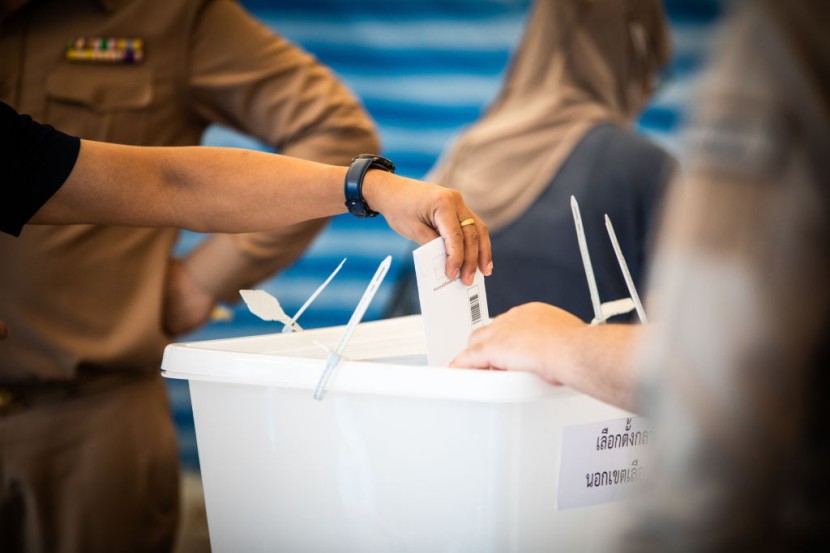
As Thailand proceeds to the polls on Sunday, a "lost generation" of young voters driven by a desire for change are keeping taboo topics alive, such as the military's grip on the levers of power - and even regal reform.
The election on May 14 is the first since youth-led mass pro-democracy demonstrations in 2020 and only the second since a military coup in 2014 toppled an elected government, restoring a conservative cabal that has dominated the kingdom's tumultuous politics for decades.
Young Radicals Stand for Thailand's Election
While an old battleground has emerged between democratic allies and pro-military parties, at the core of this year's election is a struggle led by a younger generation that envisions a better Thailand. Both populist Pheu Thai and progressive Move Forward are campaigning to remove the military from politics and are currently dominating the polls, as per CNN.
The opposition Pheu Thai seeks a landslide victory. Paetongtarn Shinawatra is one of the party's three candidates for prime minister and the most recent member of a controversial political dynasty to run.
Her father, Thaksin, a former constable turned billionaire telecoms magnate, and her aunt, Yingluck, led administrations overthrown by military coups. In their absence, Thai courts have sentenced them to prison on corruption charges despite their exile.
Since 2001, Thaksin-aligned parties have won every election. They are trendy among the rural and urban working classes of Thailand. Analysts, however, are describing Move Forward as a "game-changer." The party's platform, running for the first time, includes a radical national reform agenda threatening to upend Thailand's conservative establishment.
It promises extensive structural reforms to how Thailand is governed, including changes to the military, the economy, the decentralization of power, and even the monarchy, which was previously sacrosanct. Reuters reported last week that two separate opinion polls placed Move Forward's leader, 42-year-old Pita Limjaroenrat, as the favorite for prime minister, suggesting that the party's reform platform is appealing to Thais of all ages.
The emphasis on youthful voters comes three years after student-led protests shook Thailand by challenging the military's long-standing influence in politics and, in a startling turn of events, by questioning the king's role in society, a previously taboo subject.
Although Move Forward was not officially a part of the student protests, several activists are vying for office as party candidates, and many are party workers. Its progressive campaign platform incorporates many of the demonstrators' demands, including, most contentiously, the amendment of a criminal law that makes insulting the monarch punishable by up to 15 years in prison.
Move Forward has also adopted the rewriting of the constitution to limit the military's authority, the abolition of military conscription, and the replacement of appointed provincial administrators with elected ones.
A late surge in the polls for Move Forward and its young leader, 42-year-old Pita Limjaroenrat, indicates that the spirit of the protests appears to have spread to the broader electorate, which is weary of the old divisions that have torn the country apart for nearly two decades.
Paetongtarn Shinawatra's Pheu Thai party, predicted to win the most seats, has courted young voters by claiming that a decisive victory would enable it to remove the military generals from power. According to The Guardian, it has pledged to pursue an end to military conscription, approval of equal marriage, and an increase in the minimum wage.
According to Dr. Pitch Pongsawat of Chulalongkorn University, the political outlook of first-time electors has been influenced by the current prime minister, Prayuth Chan-Ocha, a former military general who seized power in a 2014 coup.
This weekend's election is the first since widespread youth-led protests in 2020 demanded Prayuth's resignation and the removal of the military from politics. Student protest leaders also risked prison time to demand a reduction in the royal family's power and wealth and repeal the lese majesty law, which criminalizes and punishes criticism of the monarchy.
Since the protests, over 230 individuals, including minors, have been charged under a law that carries a maximum sentence of 15 years in prison.
Whether citizens should have the right to criticize the monarchy has emerged as a new political faultline, and this election is the first time that public leaders have substantively debated the lese majesty law, according to political commentator Ken Mathis Lohatepanont.
Move Forward has stated that it will advocate for the reform of the law, while Paetongtarn has stated that the issue should be discussed in parliament. Conservative parties oppose reform vehemently.
Thailand Elections
Thailand is a democratic monarchy. The chief of state is King Vajiralongkorn, but he has little direct influence over the government, which the prime minister administers.
Per The Washington Post, the prime minister is chosen by the National Assembly, comprised of the Senate and the House of Representatives. After acquiring power in a coup in 2014, Thailand's military leaders gave the military the authority to appoint all 250 members of the Senate, leaving only the 500 members of the House up for election.
Existing senators, including Prayuth's brother and close aides, are expected to demonstrate overwhelming support for the military in this election, as they did in 2019, indicating that the opposition must win 376 out of 500 House seats to have a chance of forming a government.
The rising cost of food and fuel, or what the Thai refer to as "mouth and stomach" issues, has been a major concern. Parties have, with few exceptions, pledged large post-election benefits that many analysts believe the country needs help to afford. In recent years, Thailand's economic development has lagged behind its neighbors, and the governing government has been criticized for failing to attract more investment from emerging industries such as technology.
Related Article : Violent Pakistan Protests Erupt Following Former PM's Arrest
© 2025 HNGN, All rights reserved. Do not reproduce without permission.








